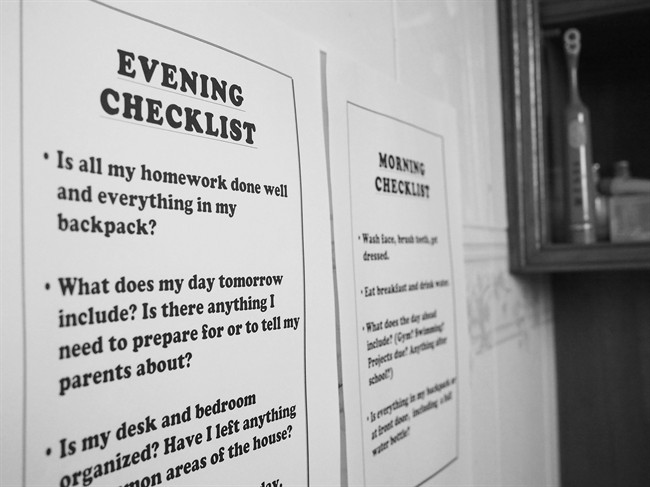As she raises two daughters while managing a yoga studio, Nashville mom Jennifer Derryberry Mann swears by Google calendars on her phone to keep everyone organized.

For Kelly Ubinger, working and raising four kids in Pittsburgh requires a huge, paper wall calendar with everyone’s activities recorded.
In Washington, D.C., single mom El Brown uses the digital organizing app Cozi to co-ordinate life with her son while running a business and pursuing a doctorate degree.
Strategies vary widely, but many parents agree that having some kind of system to manage schedules is important — especially at this time of year.
“Families with kids can wing it on lazy summer mornings,” says Cynthia Ewer, founder of OrganizedHome.com.
“Back-to-school brings new organizational challenges. Adding school, extracurricular activities and sports to a family’s schedule can cause chaos unless you’ve got a good grip on time management.”
As the school year begins, some suggestions on creating and improving a family system that works:
THE “WHERE”
Designate spots for permission slips, soccer cleats, musical instruments and more — what Ewer calls “the miscellany that will float through the household starting on the first day of school” — so you don’t waste time trying to find it each day.
She suggests creating a “family launch pad” in a common area. You might place a file box on a shelf and fill it with colour-coded folders (one for each child’s paperwork), or tack plastic pouches to a wall, each labeled with a child’s name. Donna Smallin Kuper, founder of Unclutter.com, uses Post-It Wall Pockets for this purpose.
Add hooks beneath the pouches or shelf for jackets and lunch boxes, and place labeled bins on the floor beneath each hook. Have kids drop backpacks in their bin, along with other items that go with them to school. Bins and baskets are helpful for kids, says Smallin Kuper, because tossing shoes or unfolded clothing in them is much simpler — and more likely to happen — than arranging shoes in a row, or folding clothes and putting them in drawers.
Craft blogger Jennifer Yates has created a family “command centre” using two old window screens, one for each child. She glued clothespins onto the frames for posting papers; attached wooden hymnal holders reclaimed from church pews to hold other papers and small items; and added a row of hooks.
“It hasn’t helped me always turn in things on time,” Yates says, “but at least it keeps us from losing important papers. And it gives us a place to show off their work, too.”
THE “WHAT”
The family organization app Cozi includes a calendar function that can be shared among family members’ devices and easily updated by kids or parents. The app also lets you record meal plans, and shopping and “to do” lists.
Similarly, Outlook, Apple and Google calendars can be customized with colour-coded entries for each family member, and updated and shared among devices.
If you prefer low-tech, a large paper calendar hung in a central spot can be colour-coded for each person, and you can achieve some of the portability of a digital calendar by snapping a photo of the calendar with your phone before leaving home.
Mann, the Nashville yoga teacher, combines both approaches: She uses Google calendar but also has her daughters’ schedules written in colorful marker and tacked to the wall.
A digital list-maker can help you avoid making multiple, time-consuming trips to the store. Family members can update it from wherever they are, and you can look at it while you’re running errands. (Besides Cozi, check out the Evernote and Omnifocus apps.)
THE “WHEN”
Ubinger goes through the kids’ backpacks to retrieve papers as soon as they get home, signing permission slips and adding appointments to her calendar to make sure they’re not forgotten.
Smallin Kuper suggests getting kids involved in keeping things organized; it’s “a way to strengthen bonds.”
“You might even have just one child help you for the week with cleaning, laundry and meal prep. It makes them feel special to have that one-on-one time with you, and they are learning skills for life,” she says.
The truly organized say weekday mornings also can be made easier by prepping lunches and snacks ahead of time. Smallin Kuper suggests taking time Sunday to prep individual baggies of cut vegetables or nuts and raisins. Also do breakfast prep for the week ahead: Make a large pot of oatmeal to keep in the refrigerator, chop plenty of fruit for fast, healthy breakfast smoothies and use a muffin tin to bake mini-omelets for the whole family.
THE “HOW”
Routine can be a powerful force to keep families on track. For younger kids, post a “morning checklist” and “bedtime checklist” in their rooms. The morning plan might specify which sibling gets the bathroom first, and remind them to brush their teeth. The bedtime routine can include laying out clothes for the morning and making sure homework is in the backpack.
Kids also can help set the table for the next morning, Smallin Kuper says.
To keep homework on schedule, she suggests the TimeTimer app. “It counts down the time with a red disk that makes it easy to see how much time has elapsed and how much time is left,” she says.
If this all sounds like a lot of work, think of what the alternative might look like (frazzled). And when your carefully constructed system does occasionally fail, remember that you can try again tomorrow.
“It is really just controlled chaos, held together with constant forward movement,” laughs blogger Karen Vogel, who has homeschooled her six kids in northern Virginia.



Comments